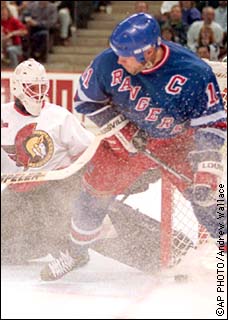

 |
| Messier is God. |
Perhaps Messier is best defined by his eyes, narrow, deep-set eyes, that peek out from under his helmet pulled down deep over his brows. The eyes dance with expectation when he's on the ice. They light up when he laughs. They glower when he is angry.
On the ice, he is subtle. There are no booming slap shots, no sudden bursts of speed, no booming checks against the boards. Instead, there is a presence, a feeling that he will be where he must be, doing what he must do.
After Messier bruised his shoulder, the Rangers seemed bewildered, looking for the guy who wasn't there. Hockey is a team game and New York has one of the most talented teams. But without Messier, the Rangers become ordinary and vulnerable.
Consider the numbers. When he got hurt, he was the team's leading scorer with 41 goals and 45 assists, pushing his career totals to 533 goals and 922 assists. His 1,455 points put him sixth on the career list. He had a plus-minus rating of plus-30, fourth best in the NHL.
He bristles at the suggestion that, at 35, he is doing all this as a senior citizen.
"We only have the past to go by, to draw comparisons," he said. "Why is 35 old? Because players in the past retired at 35? That doesn't make 35 old. Just because you're 35, you're supposed to be old. I feel great, physically as good as ever, as committed physically and mentally as I was at 25."
That's a good thing, because it is not clear what would happen to the Rangers without Messier. He is the leader of their pack, a man who owns six Stanley Cup rings, two more than his old pal, Wayne Gretzky. He won a Cup in his hometown of Edmonton after Gretzky had been traded away and then, as if adding an exclamation point to his resumé, won another in New York, ending more than half a century of hockey frustration there.
For a long time, New York was a hockey wasteland, a place to be avoided at all costs by players who grew up in tiny towns across Canada and would be intimidated and ignored by the big city. Messier erased that image and embraced the city. It has embraced him back.
He lives in the heart of Manhattan, walks its streets, feeds off its energy.
"New York City has been incredible," he said. "It's only gotten better the more time I've spent here."
What about the pressure of playing in this tough town?
Messier laughed, an infectious, hearty laugh. It was a message from Mess, a statement that he'd seen more than his share of hockey urgency before, every bit as much as New York could ever have posed.
"I grew up with the same kind of pressure of having to win in Edmonton, because of Wayne and the records we had in the regular season." he said. "The pressure was incredible there. I knew it would be the same thing here.
"It's almost appealing. All that energy is what makes it exciting. You use that pressure, turn it in to a positive energy to propel yourself."
As soon as Messier got to New York, he was anointed by management, awarded the captain's job, a decision the club has never regretted. Messier knew what the team expected of him, and he delivered.
"Good teams always need good leaders," he said. "It starts there."
At Edmonton, the glitzy leader was Gretzky, a flashing neon beacon that demanded attention because of his bushelful of goal-scoring records. The gritty leader was Messier, a fluorescent light that lit the way for a brilliant supporting cast to win four Cups.
When Gretzky was traded to Los Angeles it was a challenge to Messier and he answered it with another Cup. He credits that one to the talent that was left behind -- Jari Kurri, Bill Ranford, Esa Tikkanen. Then Messier was traded to New York and won another Cup. Again, he says, the talent -- Mike Richter, Adam Graves, Brian Leetch -- was there, waiting to win.
In each case, though, it was Messier who drew out that ability and converted it into a Cup. He was the catalyst, a hockey Pied Piper.
"You learn a lot through experience," Messier said. "Having the respect of your teammates means they have to trust you that you're looking out for their interests. When you appeal on that level, you mold the group together. When you're nonthreatening it helps the entire cause. Trust is a big part of any leadership. You have to appeal to everybody on different levels.
"Nobody wins by himself. A great player needs to be surrounded by talented players."
So what is it beyond goals and assists that makes Messier great? Hockey Hall of Famer Rod Gilbert, a Ranger hero of two decades ago, considered the question.
"What made Eisenhower great? What made Winston Churchill great?" he said. "He has the mentality and strength and support to be a leader. He is gifted physically and he has a tremendous heart. He has tenacity and perseverance and the ability to say the right words."
Why Messier and not someone else?
"It is in here," Gilbert said, tapping his head. "And it is in here," he added, tapping his heart.